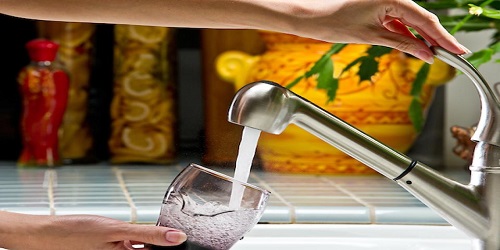Drinking Water Meaning
Drinking water (potable comes from the Latin verb “potare” meaning “to drink”) is water that can be used for human consumption without adverse effects on the body. Untreated or unpurified water may contain viruses, bacteria, toxic and radioactive substances, clay particles, algae, and minerals in quantities other than those required.
In order for water to be consumed without restrictions and in a reliable manner, it must be purified.
Although we find a lot of water on our planet, the water destined for human consumption is scarce, since only fresh water is used, which represents forty-two million of the total 1.4 billion cubic kilometers. Of the freshwater, the largest amount is found in frozen areas, and only a small part, 20%, is found in rivers, lakes, and groundwater. Water for consumption comes mostly from water basins.
The plants responsible for purifying water in urban centers are the ones responsible for purifying water, where the water undergoes several filtering and chlorination processes (production stage) before it reaches homes through distribution networks via properly disinfected pipes (distribution stage).
Among the fundamental human rights is the right to health. Not having drinking water, without running water, which forces people to take it from wells or streams, which are not always suitable, can cause many problems such as diarrhea, especially fatal in small children; or cholera. In Argentina, 97% of rural inhabitants and 18% of urban inhabitants do not have this service. In Africa, there are about three hundred million people who lack this vital element.
Drinking Water Meaning in Hindi
पीने का पानी (पीने योग्य शब्द लैटिन क्रिया “पोटारे” से आया है जिसका अर्थ है “पीना”) वह पानी है जिसका उपयोग शरीर पर प्रतिकूल प्रभाव डाले बिना मानव उपभोग के लिए किया जा सकता है। अनुपचारित या अशुद्ध पानी में वायरस, बैक्टीरिया, विषाक्त और रेडियोधर्मी पदार्थ, मिट्टी के कण, शैवाल और खनिज आवश्यक मात्रा से अलग मात्रा में हो सकते हैं।
पानी को बिना किसी प्रतिबंध के और विश्वसनीय तरीके से पीने के लिए, इसे शुद्ध किया जाना चाहिए।
हालाँकि हमें अपने ग्रह पर बहुत सारा पानी मिलता है, लेकिन मानव उपभोग के लिए पानी की कमी है, क्योंकि केवल ताजे पानी का उपयोग किया जाता है, जो कुल 1.4 बिलियन क्यूबिक किलोमीटर में से बयालीस मिलियन का प्रतिनिधित्व करता है। मीठे पानी में से, सबसे बड़ी मात्रा जमे हुए क्षेत्रों में पाई जाती है, और केवल एक छोटा सा हिस्सा, 20%, नदियों, झीलों और भूजल में पाया जाता है। उपभोग के लिए पानी ज्यादातर जल बेसिनों से आता है।
शहरी केंद्रों में पानी को शुद्ध करने के लिए जिम्मेदार संयंत्र ही पानी को शुद्ध करने के लिए जिम्मेदार हैं, जहां पानी को उचित रूप से कीटाणुरहित पाइपों (वितरण चरण) के माध्यम से वितरण नेटवर्क के माध्यम से घरों तक पहुंचने से पहले कई फ़िल्टरिंग और क्लोरीनीकरण प्रक्रियाओं (उत्पादन चरण) से गुजरना पड़ता है।
मौलिक मानवाधिकारों में स्वास्थ्य का अधिकार भी शामिल है। पीने का पानी न होना, बिना बहते पानी के, जो लोगों को कुओं या धाराओं से पानी लेने के लिए मजबूर करता है, जो हमेशा उपयुक्त नहीं होते हैं, दस्त जैसी कई समस्याओं का कारण बन सकते हैं, खासकर छोटे बच्चों में घातक; या हैजा। अर्जेंटीना में, 97% ग्रामीण निवासियों और 18% शहरी निवासियों के पास यह सेवा नहीं है। अफ्रीका में, लगभग तीन सौ मिलियन लोग ऐसे हैं जिनके पास इस महत्वपूर्ण तत्व की कमी है।

